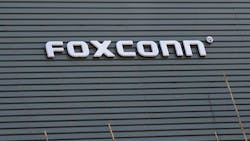Foxconn Workers Strike at China Factory
TAIPEI -- Taiwan's technology giant Foxconn (IW1000/24) on Thursday confirmed that about 1,000 workers went on strike at its factory in western China a day earlier, following a report that they were demanding higher pay.
"The group was peaceful and the workers returned to work approximately four hours later following discussions and agreements between the employees, representatives from the labor union, and management of the employees' business group," it said in a statement.
Foxconn said production at the facility in Chongqing was not affected by the action, but declined to comment on why the workers went on strike and what kind of agreements were reached.
Foxconn is the world's largest contract maker of electronics components and assembles products for leading international brands including Apple, Sony and Nokia.
According to the U.S.-based China Labor Watch, the workers were demanding pay raises and improved benefits following reduced production orders from tech firm Hewlett-Packard (IW500/9) at the plant.
The labor watchdog claimed that Foxconn compelled workers into quitting rather than laying them off and paying severance fees by significantly reducing workers' overtime hours, which generated a large portion of their wages.
Wednesday's strike was the second one this year at the Chongqing plant due to a reduction in HP orders, after 800 workers went on strike to demand proper severance pay in June, said China Labor Watch.
Foxconn has come under the spotlight in recent years after suicides, labor unrest and the use of underage interns at its factories in China, where it employs more than 1 million workers.
In 2010, at least 13 Foxconn employees in China died in apparent suicides, which activists blamed on tough working conditions, prompting calls for better treatment of staff.
Copyright Agence France-Presse, 2014
About the Author
Agence France-Presse
Copyright Agence France-Presse, 2002-2025. AFP text, photos, graphics and logos shall not be reproduced, published, broadcast, rewritten for broadcast or publication or redistributed directly or indirectly in any medium. AFP shall not be held liable for any delays, inaccuracies, errors or omissions in any AFP content, or for any actions taken in consequence.
